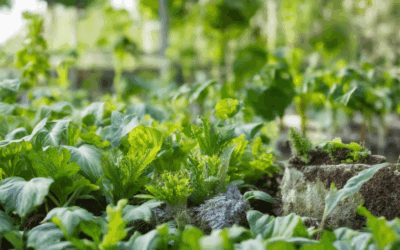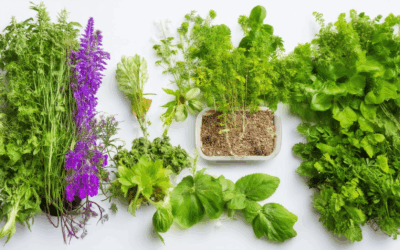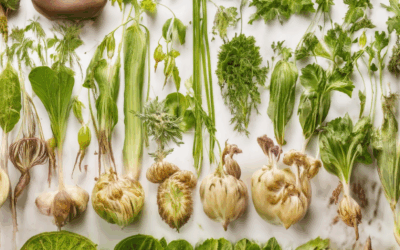In the ever-evolving world of sustainable gardening and agriculture, heirloom seed networks have emerged as a cornerstone for preserving biodiversity and promoting organic growth. These networks, which focus on the cultivation, preservation, and distribution of heirloom vegetable seeds, play a pivotal role in ensuring the continuity of rare and unique plant varieties. As demand for non-GMO, open-pollinated, and sustainably sourced seeds grows, heirloom seed networks have become a trusted resource for gardeners, farmers, and food enthusiasts alike.
Key Takeaways
– Pros of Heirloom Seeds: Heirloom seeds offer biodiversity and sustainability, ideal for organic and eco-friendly practices.
– Genetic Stability Issues: Heirloom seeds may have genetic instability compared to hybrid varieties, affecting uniformity.
– Lower Germination Rates: These seeds may have reduced germination due to aging and lack of synthetic treatments.
– Pest Susceptibility: Open-pollination makes heirloom seeds more vulnerable to pests and diseases.
– Labor-Intensive Growth: Requires more attention and care compared to other seed types.
– Limited Variety Availability: Rare or unique varieties can be challenging to source.
– Storage Challenges: Proper storage is crucial for longevity and viability.
– Environmental Impact: May spread aggressively, impacting local ecosystems.
– Freezing Tips: Use silica gel and vacuum-sealed bags for effective freezing.
– Alternative Storage Methods: Consider seed banks or paper envelopes for different needs.
– Seed Type Considerations: Larger seeds like peppers and tomatoes fare better when frozen.
– Use Frequency: Frequent users may not need freezing unless managing a large collection.
– Long-Term Preservation: Ideal for preserving genetics for future generations.
– Heritage vs. Heirloom: Distinct histories, with heritage often tied to cultural backgrounds.
What is the best heirloom seed company?
When searching for the best heirloom seed companies, it’s essential to consider factors like variety, reliability, and customer support. Below is a curated list of top companies known for their high-quality heirloom seeds:
- Seeds of Change – Renowned for their organic and non-GMO seeds, Seeds of Change offers a wide range of heirloom varieties. Their commitment to sustainability and fair trade practices makes them a trusted choice for many gardeners.
- Johnny’s Selected Seeds – Known for their premium seeds and extensive catalog, Johnny’s Selected Seeds is a favorite among both home gardeners and professional farmers. They specialize in heirloom and open-pollinated varieties.
- Rare Seeds – Specializing in rare and heirloom seeds, Rare Seeds is a go-to for hard-to-find varieties. Their focus on genetic diversity and seed preservation makes them a valuable resource for enthusiasts.
- Sustainable Seeds Co. – Dedicated to eco-friendly farming practices, Sustainable Seeds Co. offers heirloom seeds that are both organic and ethically sourced. They emphasize biodiversity and sustainable agriculture.
- Grow Organic – A leader in organic gardening supplies, Grow Organic carries a selection of heirloom seeds that are perfect for small-scale farming and home gardens. Their seeds are rigorously tested for germination rates.
- Heirloom Society – Focused on preserving traditional plant varieties, the Heirloom Society provides access to rare and heirloom seeds. They work closely with local farmers and seed banks to ensure genetic diversity.
- Mountain Valley Seeds – Offering a mix of heirloom and open-pollinated seeds, Mountain Valley Seeds is known for their robust and disease-resistant varieties. They cater to both casual gardeners and serious farmers.
- Nature & Kale – Specializing in organic and heirloom seeds, Nature & Kale is committed to providing high-quality seeds that promote healthy growth and sustainable living. Their seeds are free from synthetic chemicals and genetically modified organisms.
Each of these companies brings unique strengths to the table, whether it’s through their commitment to sustainability, variety of seed options, or customer service. When choosing an heirloom seed company, consider your specific needs and preferences to find the best fit for your gardening goals.
Is It Illegal to Save Heirloom Seeds?
Saving heirloom seeds can be legal or illegal depending on the specific circumstances and the nature of the seeds involved. Here’s a breakdown:
- Patented or Proprietary Seeds :
Seeds that are patented or otherwise owned by corporations may fall under intellectual property laws. Saving and distributing such seeds without authorization can be illegal. This applies particularly to hybrid or genetically modified seeds that have been developed with significant investment. - Open-Pollinated Seeds :
Open-pollinated heirloom seeds, which are not subject to patents, are generally legal to save and share. These seeds rely on natural pollination and do not involve controlled breeding or intellectual property rights. - Non-GMO Heirlooms :
Non-genetically modified heirloom seeds may still be subject to restrictions if they are part of a protected variety or have been developed through controlled propagation methods. It’s essential to verify the origin and ownership of these seeds before saving. - Regional Regulations :
Local laws and regulations may also impact seed-saving practices. Some jurisdictions have specific rules regarding seed propagation and distribution, so checking local guidelines is advisable.
To comply with legal requirements, consider purchasing heirloom seeds from reputable sources that offer proper licensing when necessary. This helps ensure that you are not infringing on intellectual property rights while supporting legitimate trade practices. 1
What Are the 4 Major Seed Companies?
Here are the four major seed companies that play significant roles in the agricultural sector:
- Bayer
- Known for its extensive portfolio in agricultural chemicals and seeds, Bayer has been a leader in developing high-yield crops and resistance varieties. Their seeds are widely used globally for various crops, including corn and soybeans.
- Corteva
- Specializing in seed technology, Corteva focuses on hybrid and genetically modified seeds. They are recognized for their innovation in seed production and sustainability practices, particularly in corn and sorghum seeds.
- Syngenta (ChemChina)
- As part of ChemChina, Syngenta is a prominent player in seed and agrochemicals. They emphasize research and development, offering advanced seed solutions tailored for different farming conditions worldwide.
- BASF
- BASF is known for its diverse product range, including seeds and crop protection solutions. They cater to a broad range of crops and are recognized for their commitment to sustainable agriculture practices.
These companies collectively dominate the global seed market, contributing significantly to food security and agricultural advancements.
Disadvantages of Heirloom Seeds
- Germination Rates: Heirloom seeds may have lower germination rates compared to hybrid or treated seeds due to their age and lack of synthetic treatments.
- Genetic Instability: Over time, heirloom seeds can develop genetic variations, leading to plants that may not grow as uniformly as hybrid varieties.
- Pest Susceptibility: Since heirloom seeds are often open-pollinated, they can be more vulnerable to pests and diseases compared to hybrid seeds treated with chemicals.
- Labor-Intensive Process: Growing heirloom seeds requires more attention and care, making it a more labor-intensive endeavor for farmers and gardeners.
- Limited Variety Availability: While heirlooms offer diverse traits, certain rare or unique varieties may be harder to find or source.
- Storage Requirements: Heirloom seeds require proper storage conditions to remain viable, adding to the effort needed for long-term preservation.
- Environmental Impact: The open-pollination nature of heirloom seeds can lead to plants that spread more aggressively, potentially affecting local ecosystems.
For more information on heirloom gardening and sustainable practices, visit our website . Explore our resources on traditional gardening methods and preserving agricultural heritage.
Should I Freeze My Heirloom Seeds?
Deciding whether to freeze your heirloom seeds depends on several factors, including your storage capacity, seed type, and long-term goals. Here’s a guide to help you make an informed decision:
Steps to Properly Freeze Heirloom Seeds
- Use a Desiccant: To prevent moisture, place silica gel or a desiccant packet inside the container. This helps absorb any humidity.
- Package Them Correctly: Store seeds in an airtight container, such as a vacuum-sealed bag, to maintain dryness and prevent pests.
- Label Accordingly: Clearly mark the container with the seed variety and storage date to keep track of your seeds.
- Store in a Cool, Dry Place: Place the container in a refrigerator set to 35-40°F (2-5°C) or in a stable, dry location away from sunlight and moisture.
- Monitor for Viability: Test seeds periodically for germination to ensure they remain viable. Sprout a few seeds monthly to check their readiness for planting.
Alternatives to Freezing
- Cool, Dry Storage: If you prefer not to freeze, keep seeds in a cool, dark, and dry place, such as a closet or pantry, ensuring consistent temperatures between 50-60°F (10-16°C).
- Use a Seed Bank: Consider storing seeds in a seed bank for long-term preservation, though this may require purchasing a membership.
- Paper Envelopes: Some gardeners opt to store seeds in labeled paper envelopes, especially if you plan to plant them within a year.
Considerations Before Freezing
- Seed Type: Larger seeds, like those from peppers or tomatoes, tend to fare better in freezing conditions compared to smaller seeds.
- Frequency of Use: If you plan to use seeds frequently, freezing might not be necessary unless you have a large collection.
- Long-Term Goals: If you aim to preserve heirloom genetics for future generations, consider more robust storage methods like seed banks or gene banks.
Remember, proper storage ensures your heirloom seeds remain viable for years to come. For more tips and resources on preserving your seeds, visit our Seed Storage Guide .
What is the difference between heirloom and heritage seeds?
Heirloom seeds and heritage seeds are both types of seeds with rich histories, but they have distinct characteristics and contexts.
- Heirloom Seeds: These are seeds that have been passed down through generations. They are often preserved and treasured for their unique traits, hardiness, and ability to grow in specific regions. Heirloom varieties may have been around for decades or even centuries, making them rare and valuable.
- Heritage Seeds: The term “heritage” is less commonly used in North America but carries a similar meaning. Heritage seeds often refer to plants with a direct cultural or ethnic lineage, such as crops that have been grown in a particular region for a long time. For example, certain bean varieties like Romano beans are considered heritage due to their historical significance in Italian cuisine.
Both types of seeds emphasize sustainability, biodiversity, and the preservation of traditional plant varieties. They are popular among gardeners and farmers who value organic and eco-friendly practices.
To learn more about heirloom and heritage seeds, visit our website or explore resources from trusted seed banks and gardening organizations like Seed Savers .
When choosing seeds, consider factors like climate suitability, germination rates, and ease of growth to get the best results from your heirloom or heritage seeds.








0 Comments